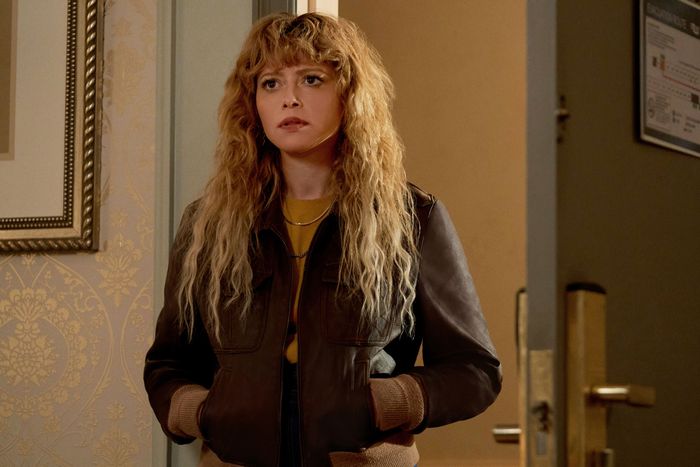
A couple episodes into Poker Face, the new Peacock series’ true nature starts to come into focus: It’s just a touch boring. Not too much! But this old-school detective series lets itself drag in places, lingering on details and minor logistics, taking its time to sift through each red herring and every clue. Set against the headlong plot-rush binge model of typical streaming mysteries, Poker Face’s measured pace looks downright leisurely.
But then, like its nonchalant lead detective Charlie Cale (Natasha Lyonne), Poker Face is not in a hurry. It’s not trying to outrace its viewers or leap into some unexpected twist before anyone has time to see it coming. Poker Face is not a show to fly through because you’re desperately longing to see what happens at the end. It’s a show to watch because you already know what the end will look like, and all the half-tedious, half-revelatory step-by-step machinery that gets you there is the fun part.
Created by Rian Johnson of Knives Out and Star Wars: The Last Jedi fame, Poker Face is something weirdly rare in the world of streaming television: an episodic drama. Lyonne’s Charlie is a loyal, chilled-out casino employee just doing her best to make it through the workweek and also happens to have an unusual talent for identifying lies. The show’s first episode is a set of circumstances that could’ve launched that much more typical version of a streaming mystery: A murder happens; Charlie is determined to find justice but gets mixed up in forces beyond her control; she makes some powerful enemies (including Benjamin Bratt, playing an excellent sly baddie); she’s now on the run. It’s not hard to picture the familiar version of what would come next: Charlie gets double-crossed, she makes friends and enemies, and they stumble through a few staid cliffhangers until arriving at a shocking (yet predictable) conclusion.
Poker Face is interested in none of it. All of that premiere place-setting is just the necessary process of laying the groundwork for the show it actually wants to be, as Charlie, forced to go on the run, becomes an accidental itinerant detective. She’s a picaresque gumshoe, a free spirit who arrives in a new location, gets a gig at a restaurant or theater or retirement home, and then somehow finds herself wrapped up in someone’s unfortunate, untimely demise. Every episode offers a new cast and a new crime to solve, and every murder gets wrapped up neatly by the end. It’s not a show that relies on Easter eggs or long-arc plotting, and it’s not a slow-burn elaborate tapestry of interwoven threads, either. It’s direct, it’s cut-and-dried, and it’s radically uninterested in catching viewers by surprise.
That ideology extends to the mysteries, too. They play out Columbo style, beginning by establishing the new setting, watching the murder take place, and then rewinding to reveal how Charlie fits within the story, lurking there all along as a bystander who must now put together the pieces. It’s like a jigsaw puzzle, except instead of asking you to sort out all the edge pieces, you’re calmly watching someone else figure out where all the corners are.
What this means for Poker Face is that every episode has to pull its own weight, and inevitably some are better than others. The show is cast with an absolute bonanza of fun, oddball talent, some of whom come with that distinct sheen of “we’re just casting all our friends”: Adrien Brody, Dascha Polanco, Hong Chau, Judith Light, Nick Nolte, S. Epatha Merkerson, Tim Meadows, Cherry Jones, Rhea Perlman, Clea DuVall, Chloë Sevigny, Luis Guzmán, Lil Rel Howery, this list could go on for several more lines and several more five-star names. But in some entries, the cast doesn’t quite gel or the cases themselves lack the buoyancy necessary to counteract their inherently staid format. An episode where Tim Meadows plays opposite Ellen Barkin as former co-stars and nemeses, for instance, gets in lots of fond jabs at cheesy local-theater productions, but never manages to settle into itself long enough to obscure the heavy-handed murder mechanics. In another one, Howery is fantastic as the brother of a famous BBQ pitmaster, but the episode around him sags a little as Charlie dutifully unravels all the finicky alibis and motives and unexpected murder weapons.
But this is exactly the appeal and the strength of episodic-TV storytelling, a mode that has worked since TV began and is still dominating the network-TV prime-time schedule, yet which streaming platforms have largely avoided in favor of tap-dancing, binge-friendly plotting. It’s hard to turn away from the allure of the long-form serial, especially after two decades of enthusiasm for TV that’s “complex,” “prestige,” “serious,” “quality,” “cinematic,” and other similarly empty words that stand in for “tells a story over multiple episodes,” and Poker Face takes a risk in doing so. Unlike most serialized cable dramas, there’s little by way of overarching plot to keep you coming back to Poker Face, and its pace can feel weirdly unmotivated. Aside from the continuing presence of Lyonne, whose voice sounds like walking up a 100-year-old staircase and whose charisma is a perfect fusion of delighted but unimpressed, every episode of Poker Face feels like a blank slate, which can be a blessing or a curse. In the best ones — especially the fourth, which stars Sevigny and the Mountain Goats’ lead singer John Darnielle — the episodic characters are so fun and specific that you’d be happy to spend a whole murder-free hour with them, and you almost forget that at some point Charlie will show up. Even in the worst ones, though — the episodes where the setting is underwhelming or the story is a bit slow — Poker Face maintains its well-defined identity and the basic framework that keeps the show chugging along: Natasha Lyonne, dusty vintage ’70s road-trip aesthetics, wisecracking existentialism, murder avenged.
It is a sturdy kind of storytelling, and sturdiness is not splashy or thrilling. But it is reliable, and the show’s structural resilience fits neatly into its underlying worldview. There’s a deep, warm sweetness inside Poker Face’s ten episodes, which are written and directed by multiple people, but all share a baseline distaste for moral ambiguity. Even when a criminal’s motives are occasionally unclear, or an unpleasant side character may be surprisingly cruel, it is a series that loves to double back and make things right (or more clean, or more sympathetic) by the end. There’s an almost reflexive insistence that surely the murderers are evil, and surely the victims are, if not pure, at least wildly undeserving of their fates. In the first six episodes provided to critics, the only truly evil character allowed to thrive by the end is a racist dog, and even the dog is given a less racist off-ramp. That niceness gets boring at times, but it does help cement Poker Face’s clear, specific point of view. Each episode may be its own snarl of violence and greed, but Poker Face knows itself, and it gives viewers exactly what it has promised: a criminal, a detective, a crime, and a solution.
The first four episodes of Poker Face premiere Thursday, January 26, on Peacock, with the remaining six premiering weekly after that.





